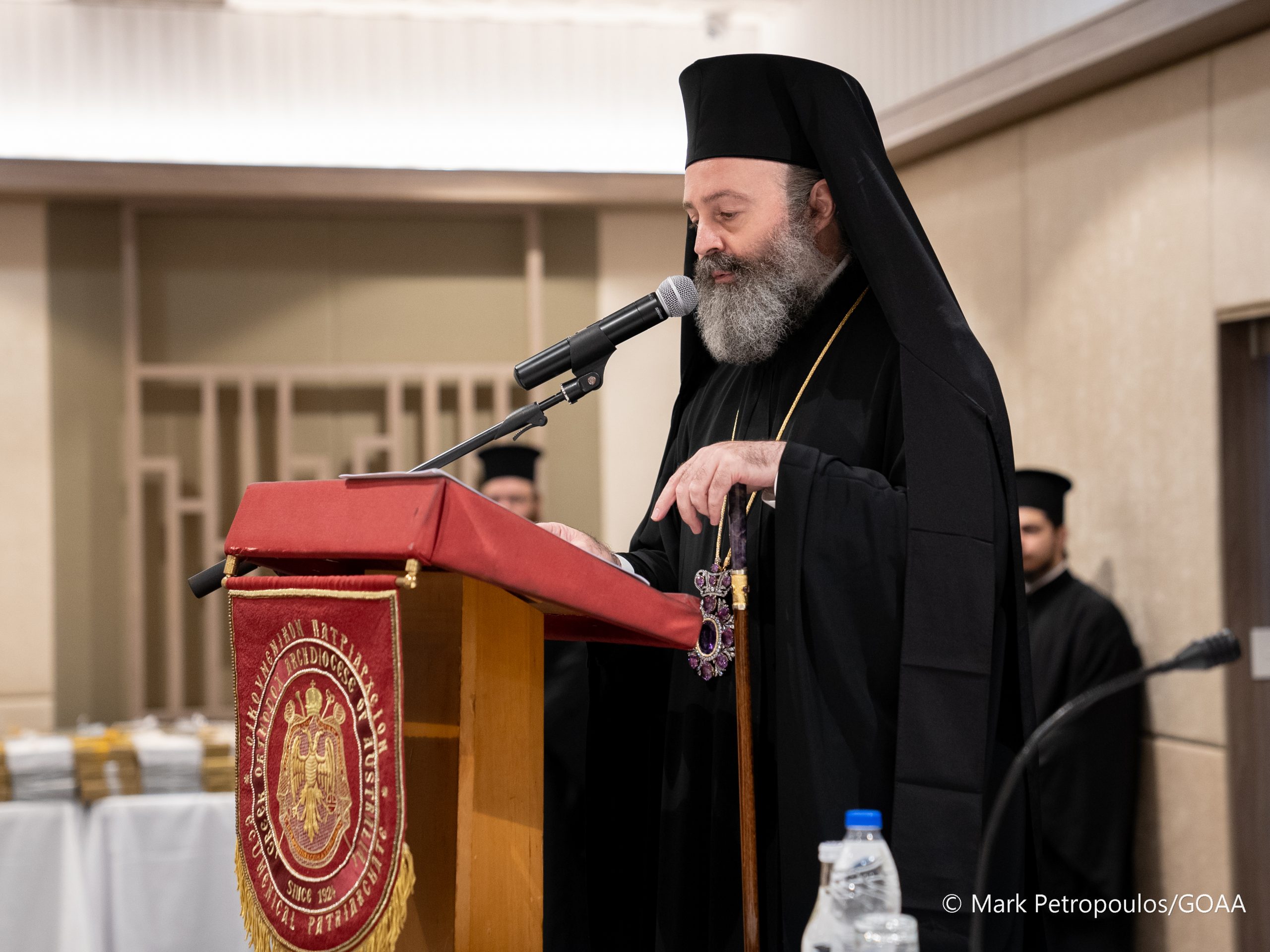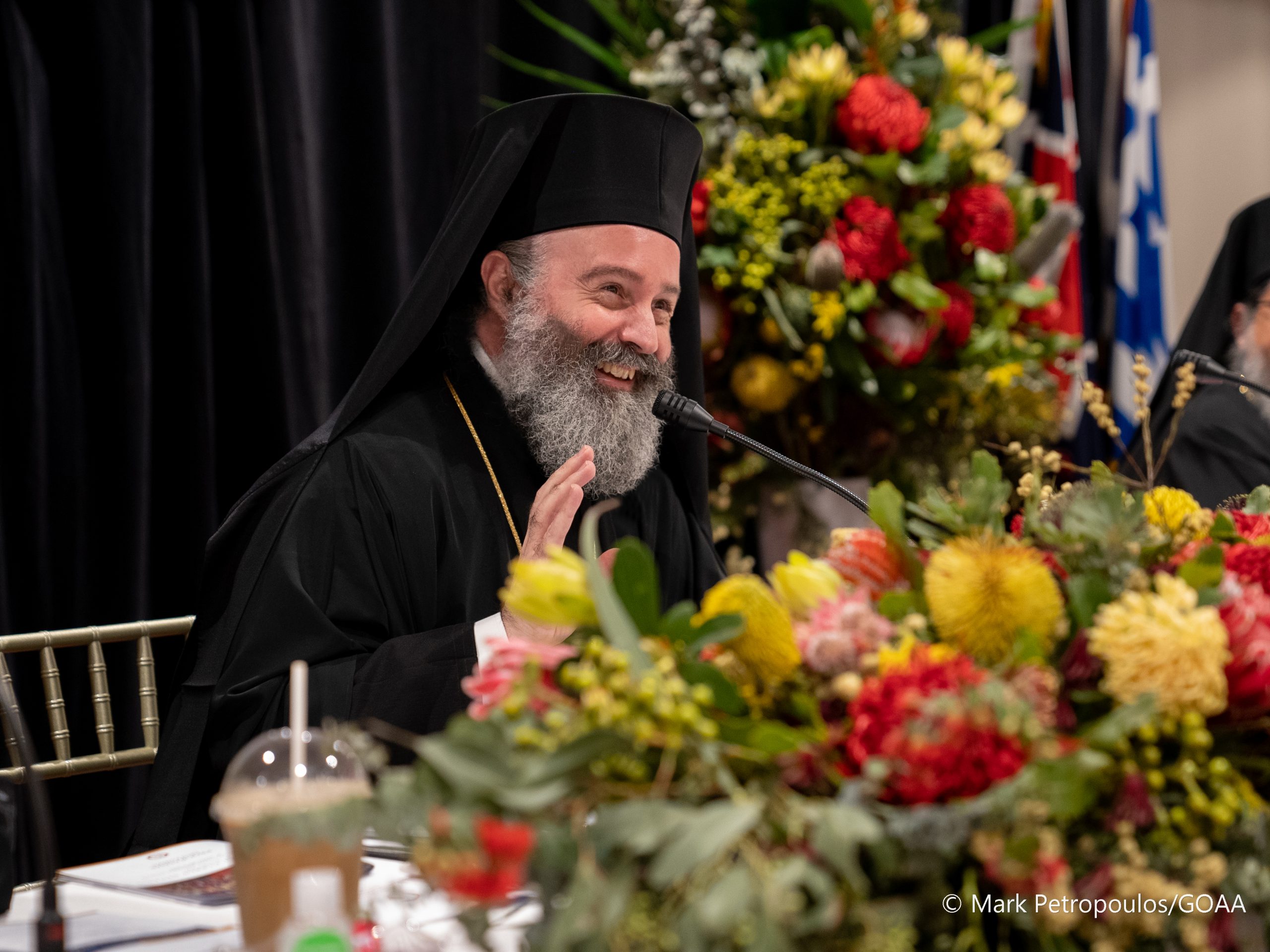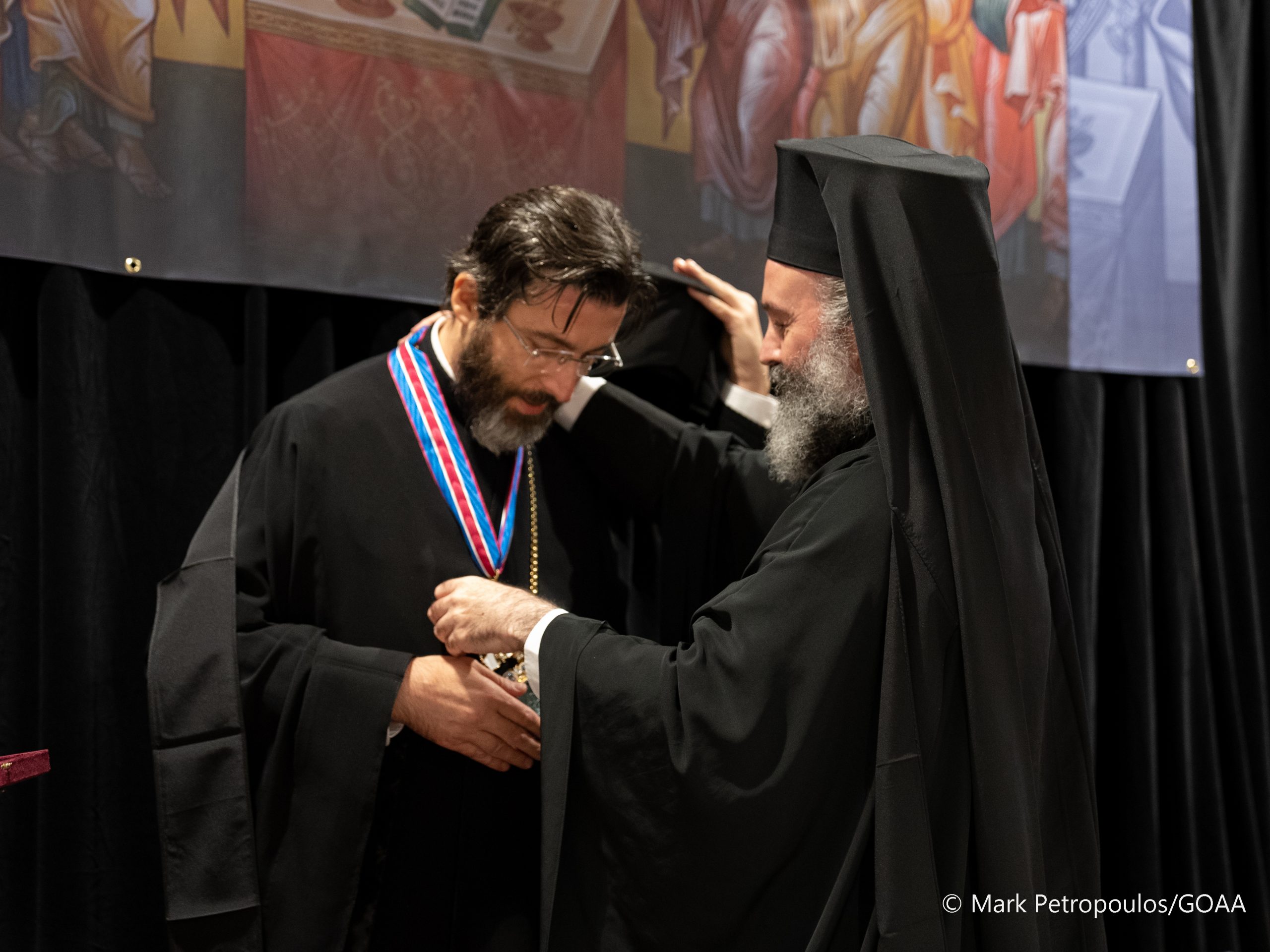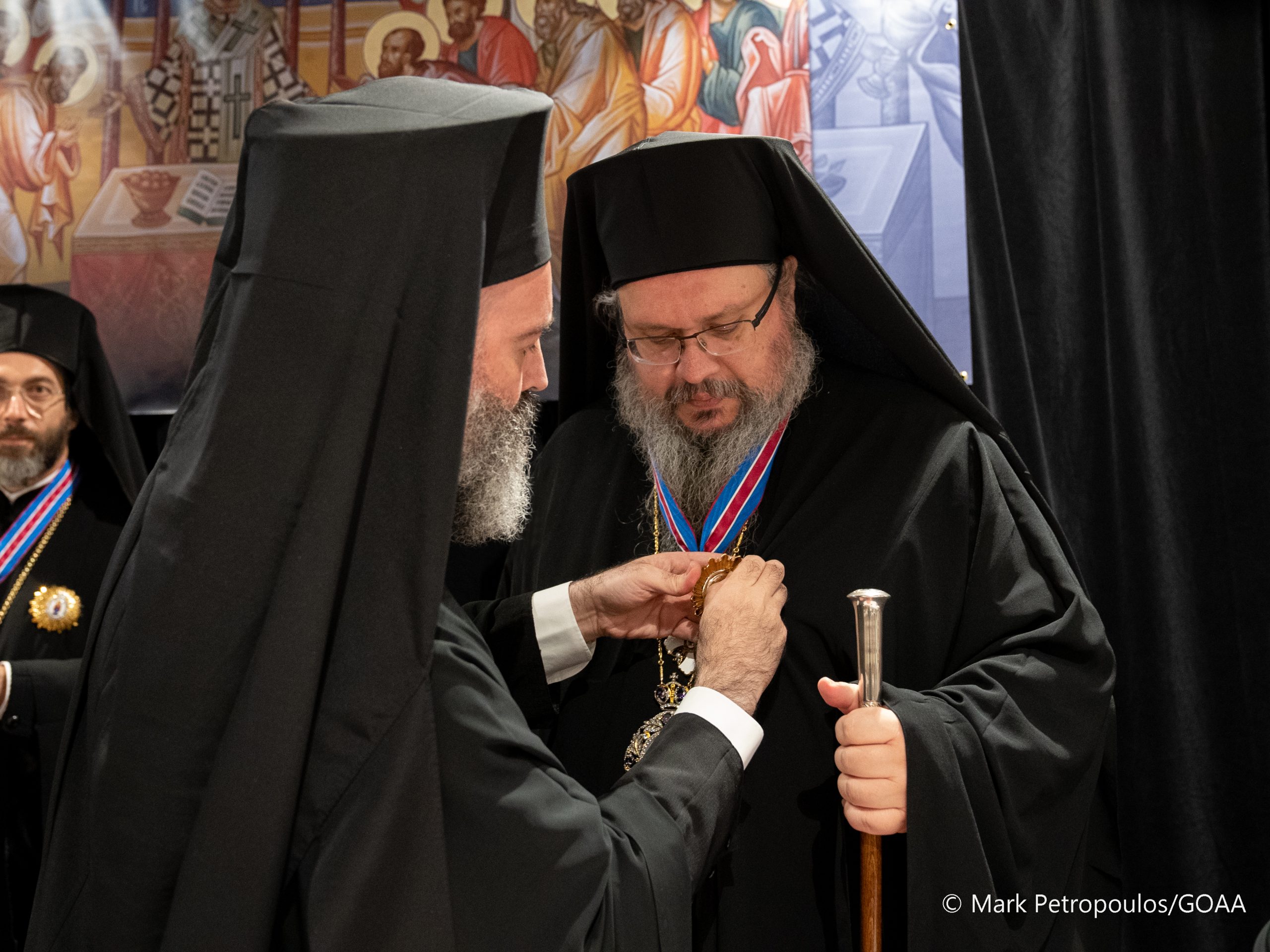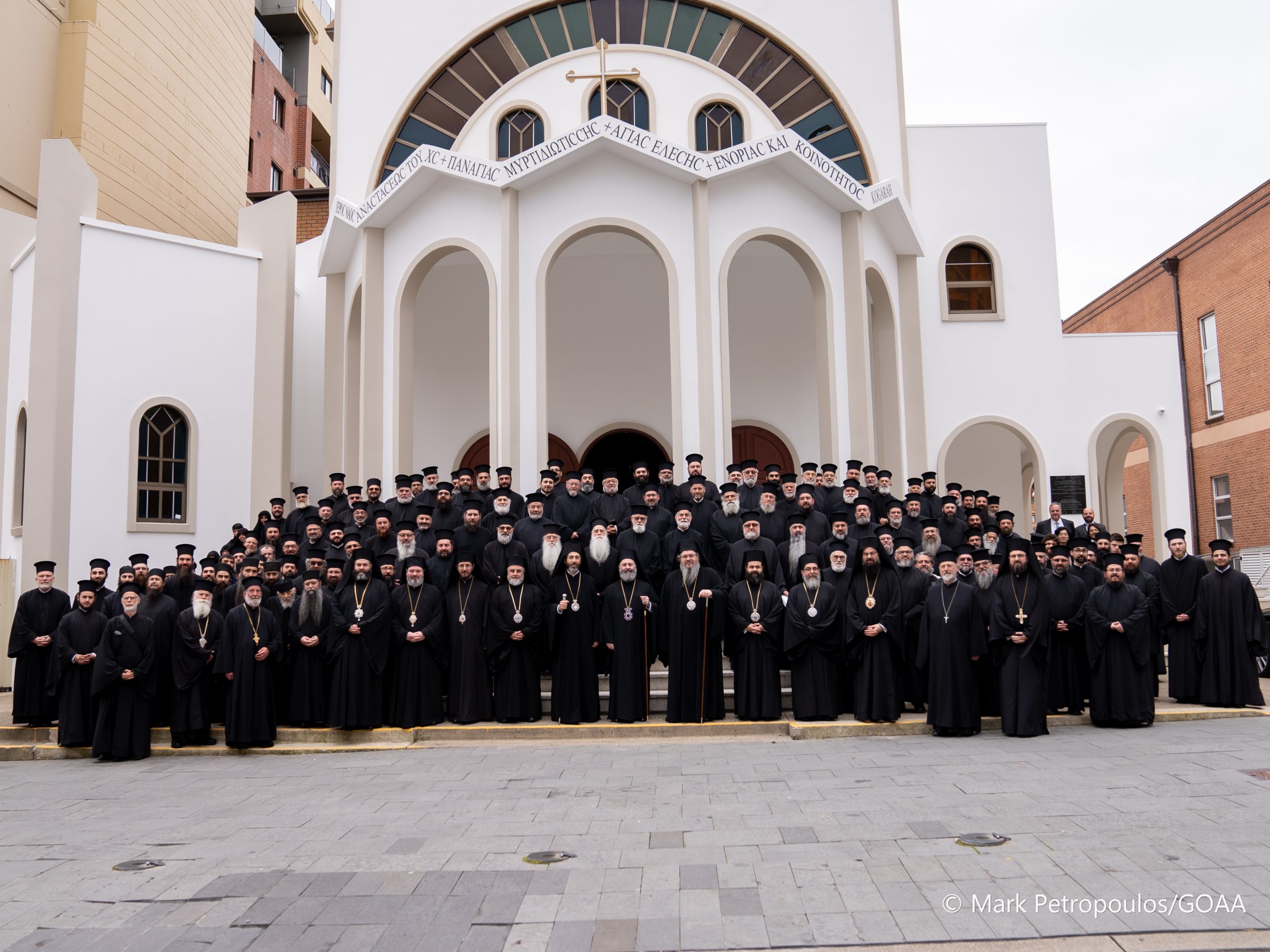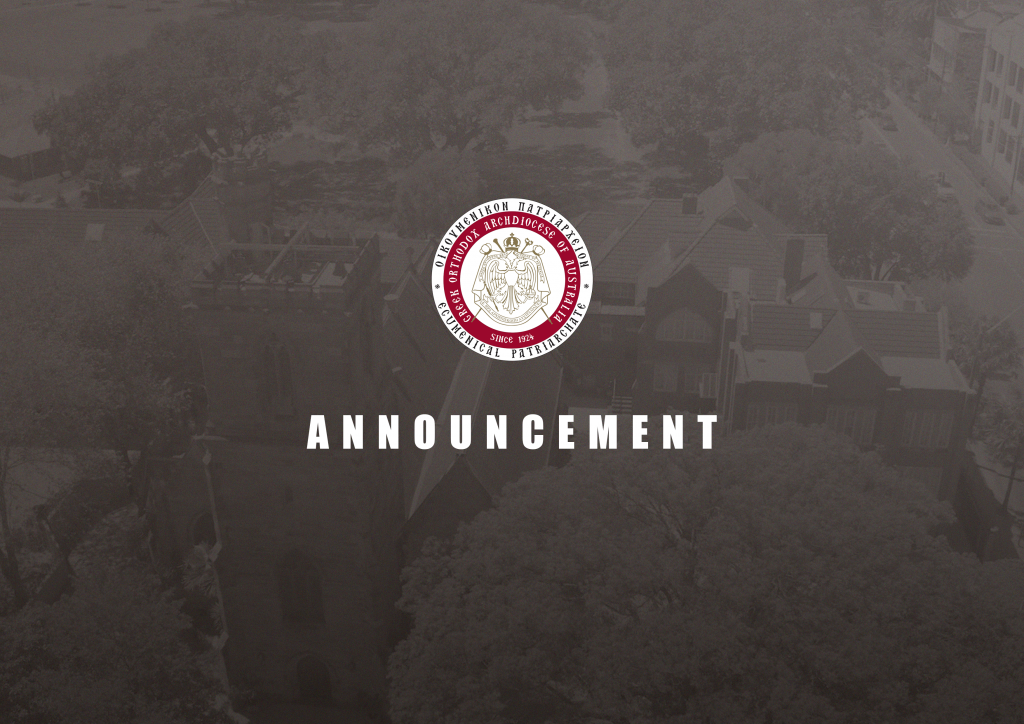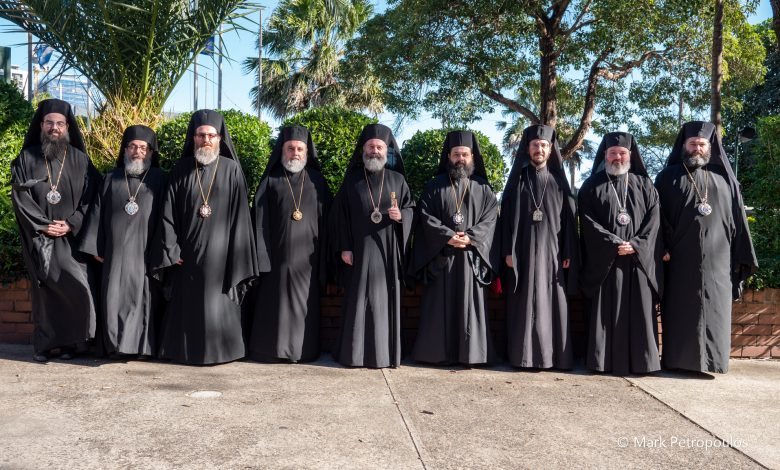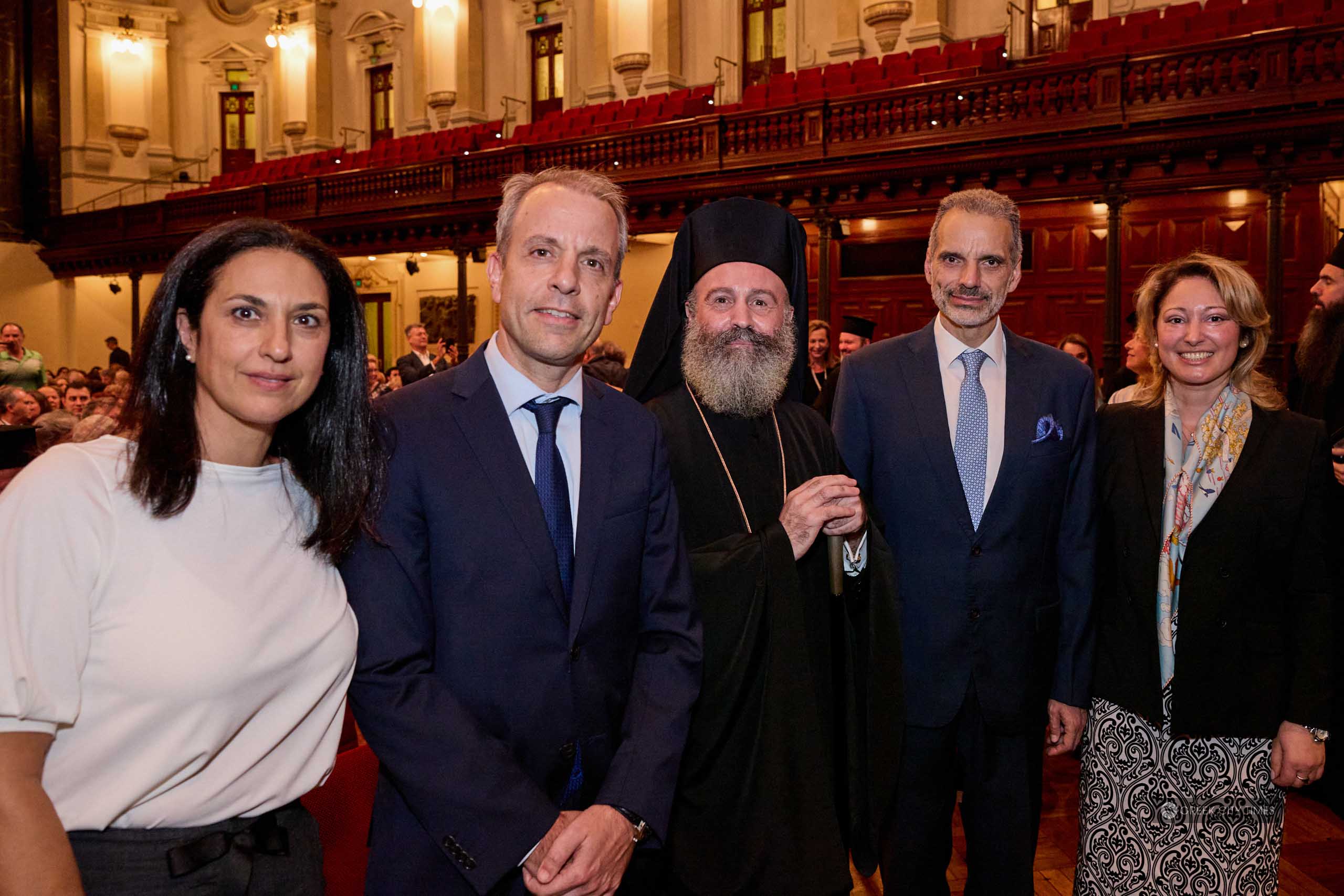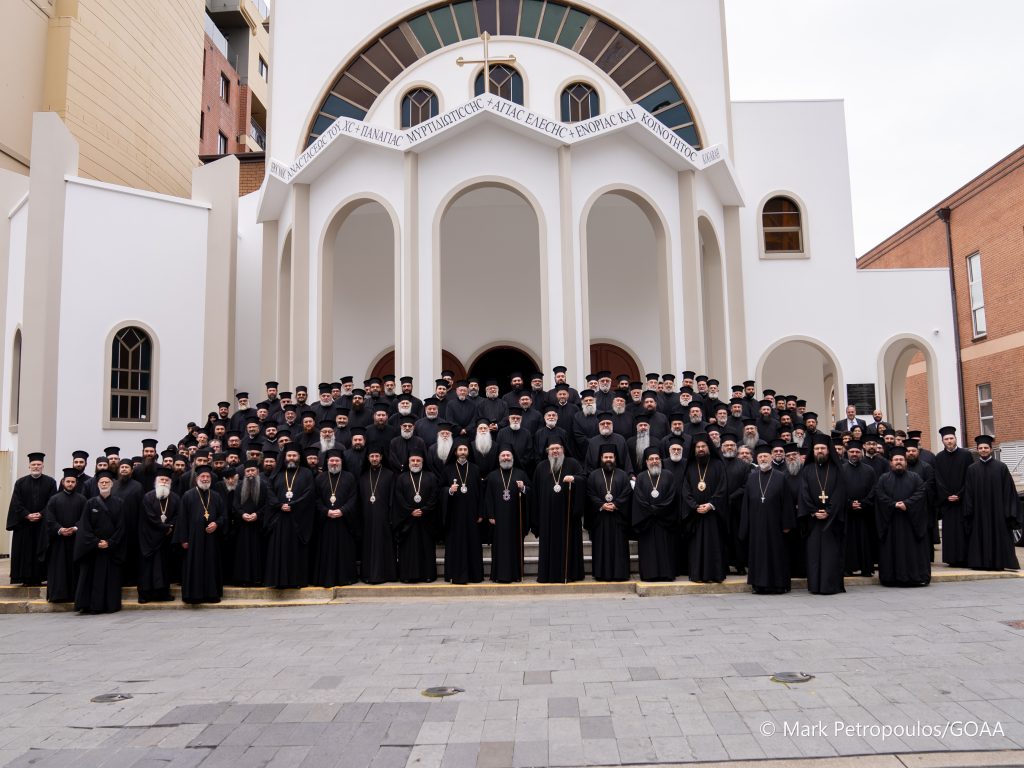
The proceedings of the first National Clergy Synaxis started on Tuesday the 18th of October with the blessing of His All-Holiness Ecumenical Patriarch Bartholomew and was attended by most of the priests of the Holy Archdiocese of Australia, monks, nuns, novices, candidates to the priesthood, as well as students of St Andrew’s Greek Orthodox Theological College in Sydney. The Clergy Synaxis is taking place in the comfortable surrounds of the spiritual centre of the Parish of the Resurrection, Kogarah, which was happily provided by the Parish-Community.
The Clergy Synaxis began with the Service of the Blessing of the Waters, performed by His Eminence Metropolitan Andrew of the Forty Churches, the distinguished representative of His All-Holiness Ecumenical Patriarch Bartholomew. Also in attendance were His Eminence Archbishop Makarios of Australia, His Eminence Metropolitan Ieronymos of Larissa and Tyrnavos as well as Their Graces Bishop Iakovos of Miletoupolis, Emilianos of Meloa, Silouan of Sinope, Kyriakos of Sozopolis, Christodoulos of Magnesia, Evmenios of Kerasounta and Bartholomew of Charioupolis.
Immediately following was the Welcome address by our local Shepherd; His Eminence Archbishop Makarios of Australia, who took occasion from the counselling advice of the late Metropolitan Meliton – then of Imvros and Tenedos and later Elder of Chalcedon – to the then priest and now All-Holiness Ecumenical Patriarch Bartholomew on the 19th of October 1969 in the Church of The Holy Trinity of the Theological School of Halki and especially from the exhortations: “Empty yourself. Be humble. And above all, give place to Divine Grace. And remain for life, until the end, until the rendering of the word to the Lord, filled with grace by God, and filled with grace before the people” and emphasised that these words are a timeless exhortation addressed to every member of the clergy. He also underlined that the “present Synaxis is being held as an opportunity to censure ourselves, to judge our own lives and to reflect on our responsibilities and obligations before the world and humankind”. He also thanked Metropolitan Andrew of the Forty Churches for coming and who is the representative of His All-Holiness Ecumenical Patriarch Bartholomew as well as Metropolitan Ieronymos of Larissa and Tyrnavos, the Assistant Bishops, but also all the Clergy, Monks and lay people who were present and for their participation and their diverse contribution to the success of the proceedings of the Synaxis.
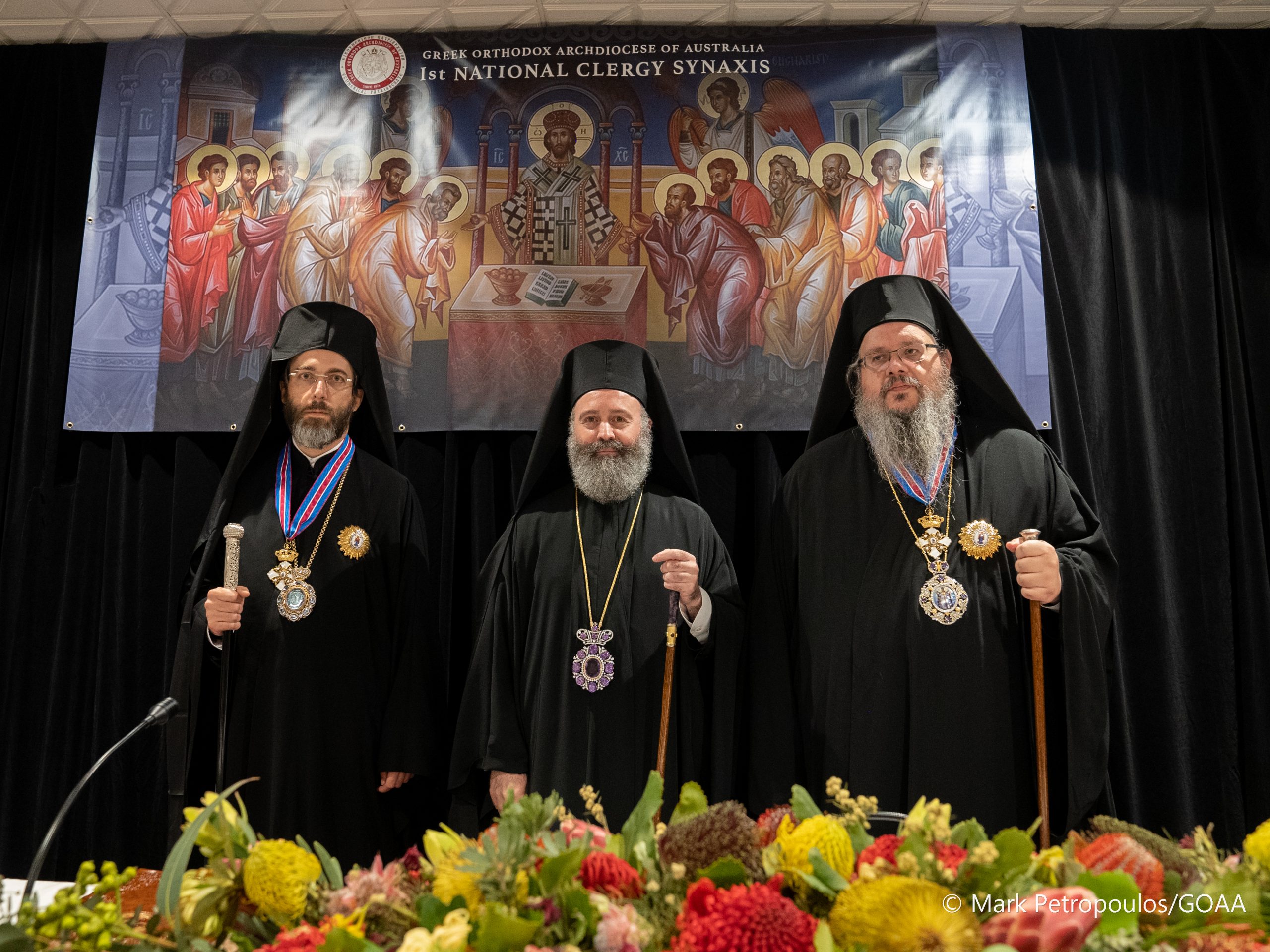
His Eminence Metropolitan Andrew of the Forty Churches then read the Greeting from His All-Holiness Ecumenical Patriarch Bartholomew to the first National Clergy Synaxis of the Holy Archdiocese of Australia with which the sacred head of Orthodoxy, in addition to the greetings of love and many blessings for the success of the proceedings of the Synaxis, expressed the Patriarchal pleasure towards His Eminence Archbishop Makarios for all he has done modestly, lovingly and with zeal during the first three years of his ministry as a “lamp upon a lampstand”. He urged the Clergy of the Holy Archdiocese of Australia: (a). To feel the great honour and privilege of belonging to the Clergy of the Holy and Great Church of Christ; (b). To embrace the truth of the Eucharistic realisation of the Church as a response to the introversion of closed spirituality and indifference to the world; (c): To rely on the Orthodox Tradition in order to be taught how to coexist with that which is different; (d): To continue, in their relation with other Christians, the tradition of the Ecumenical Patriarchate, the forerunner of the modern Ecumenical Movement and, (e): To understand that the Priest does not belong to himself but to Christ and the Church.
Their Graces, the Assistant Bishops of the Holy Archdiocese of Australia then gave their Greetings in which they highlighted the pastoral reality of Australia and alluded to the difficulties, but also to the sacrificial perspective of the ministry as the only one capable of saving the world.
The keynote presentation was given by His Eminence Archbishop Makarios of Australia with title: “The ethos of the Priesthood: from the ‘most striking change’ to modern changes”. In this, his Eminence, commencing from the fact that everything in the Church has been taught by the sacrifice and the Cross of our Lord, analysed that the object of the priestly ethos is the person, with each person being a single and unique individual. Referring to Canon 102 of the Penthekti (Quinisext) Synod, he pointed out that the priest cannot proceed in a manner that is either conciliatory or austere, but must judge and decide with a view to the salvation of the other. He referred to the personal practices that distance one from the faith and subvert it, as was the case with the Scribes and Pharisees, who did not conform to God’s teaching, but demanded rather that God conform to their own, which is characteristic of the modern-day Pharisees’ abuse of the faith. By analysing the example of the Grand Inquisitor in the well-known text by F. Dostoevsky, he urged the clergy not to make the same mistake of eliminating Christ from the cause of human salvation. He invited the priests to ask themselves how they would react if Christ came again to earth, what Christ means for each of them, and where Christ is, especially after their ordination. He also entreated the clergy not to pursue scholarly excellence alone, but should do so in combination with humility and love. Moreover, he emphasised the extent of modern secularisation in the priesthood with regards to the handling of people’s salvation for personal prestige, as creating illusions and deceiving the conscience, within the context of individualism and the acquisition of power over people. He wondered if the increase in the number of churchgoers also means an increase in the number of saints. He denounced the demagogic sermon, which often brings the street to the pulpit. He suggested that the clergy should not be interested in “appearance” but in “being” and that they should not be concerned with the opinion of people, precisely because they are involved in pastoral ministry and not in a communications strategy. Furthermore, he implored priests to encourage people to have joy, as this is a basic function and quality of life, and especially in the communion between peoples, when explaining, “they were all with one accord in one place” [on the day of Pentecost] (Acts 2:1). Finally, he recommended constant repentance as a healthy spiritual state, while he stressed that the antithesis of secularism is the combination of love and unity.
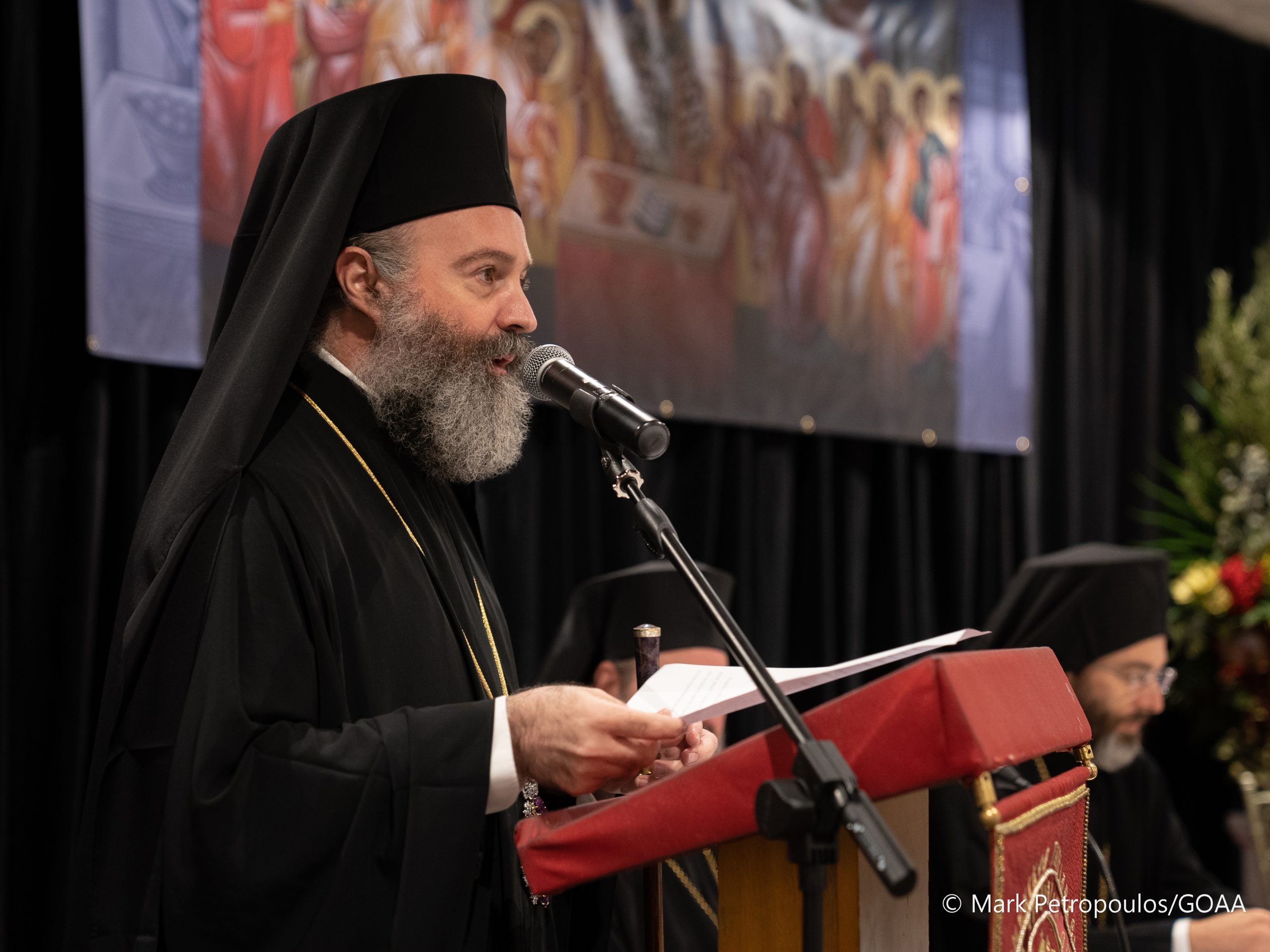
In the second address with title: “Priestly calling and priesthood in the modern world: Problems and self-criticism in the face of secularisation”, His Eminence Metropolitan Andrew of the Forty Churches, representative of His All-Holiness Ecumenical Patriarch Bartholomew, referred to the priesthood as a gift from God; the joy of coming together and meeting in the common Cup; and also to the spiritual concerns created by historical development. He emphasised that it is not the Church that is being secularised, but its members. He focussed on the eternal struggle of the sacred with the profane and highlighted the Church not as a worldly institution but as a vehicle of the coming of the Kingdom of God. The Church as the Body of Christ and communion of deification, he explained, heals the ailing personality without ignoring the present. Moving away from the life of the Church – beyond promoting profit and economics as a priority – cultivates introversion and individualism, abolishes all which is authentic and promotes rationalism. He also emphasised that the clergy need continuous self-criticism along their journey to constantly ensure they maintain their ecclesiastical ethos and attitude. He also referred to the influence of the family environment and of one’s early years in the formation of the clergyman’s personality, as well as to the ecclesiastical environment on his development and ministry. He emphasised the crucified and sacrificial nature of priesthood and warned against the wrong motives of many that lead to spiritual tragedies. He also spoke about the continuous cultivation of the soul, the need for personal development, and the existence of competent spiritual guides. Finally, he recommended the lifting of one’s personal Cross and the conscientious journey of each priest.
His Grace Bishop Silouan of Sinope then gave his talk with title: “The ministry of priesthood in a secular age”. His Grace, emphasising the importance of divine worship and how man through it participates in the divine, also highlighted Orthodox eschatology as a perspective for the completion and fulfillment of worship.
Next, His Eminence Ieronymos of Larissa and Tyrvanos spoke on the topic, “Priesthood and secularisation: If the salt loses its flavour…” In it, His Eminence addressed the problematic way in which we understand our identity as Christians, something that is also transferred to the institutional expression of the Orthodox Church and reflected in the problems observed in inter-Orthodox relations, especially in the last fifteen years. Moreover, he stressed the difficulties in our relationship with Christ, especially when it comes to Holy Communion and Worship. He also made mention of Canon 102 of the Penthekti Synod, as well as to the Lord’s words about salt and what happens if it loses its quality to season. He observed the harshness but also the reality of the Lord’s words that unseasoned salt is completely useless, which is why it is thrown away and trampled by people; an example of the utter contempt and the shattering of those who, while practising the modest profession of a cleric, we observe an inconsistency and disassociation of their way of life with their identity as priests. He characterised as unacceptable the eschatology that is developed outside the Orthodox Church in a populist manner, especially from fringe publications and newspapers, which cultivate the fear of the coming of the antichrist when the Church cultivates the sweet hope of the Lord’s return.
Then the Very Reverend Archimandrite of the Ecumenical Throne, Father Eusebios, Abbott of the Holy Monastery of Pantanassa, spoke on the topic, “The Orthodox Priest and the modern world” in which he highlighted the usefulness of the hesychastic lifestyle in the spiritual formation of the priest and in his defence against secularisation.
The Very Reverend Archimandrite Father Ignatius Moutrzanou, Chancellor of the Holy Metropolis of Larissa and Tyrvanos, developed his theme on the topic: “Challenges to our Priestly ministry today”. He emphasised that “we must look again at our calling from God within the perspective of the modern age, to realise that we are stewards of His grace, and not to submit to fear because then we will have been defeated not only personally, but also as the Body of Christ.”
This was followed by the address of Dr Philip Kariatlis, Associate Professor of Theology at St Andrew’s Greek Orthodox Theological College, with title, “The ministry of Priesthood: theological meaning and significance today.” In this, with his characteristic eloquence and scholarly depth, he highlighted the connection of Theology and Priesthood as the essential measure of the ministry of people, while also emphasising the constant need for theological training of the clergy.
The National Clergy Synaxis concluded with the presentation of the Very Reverend Protopresbyter of Ecumenical Throne, Father Panagiotis Mavrommatis, with title, “The Priest as pedagogue in the modern world”. In a clear and easily understood manner, the pedagogical dimension of the Priesthood was highlighted as a continuous regeneration of man in Christ, but also as an invitation to continuous learning and discipleship.
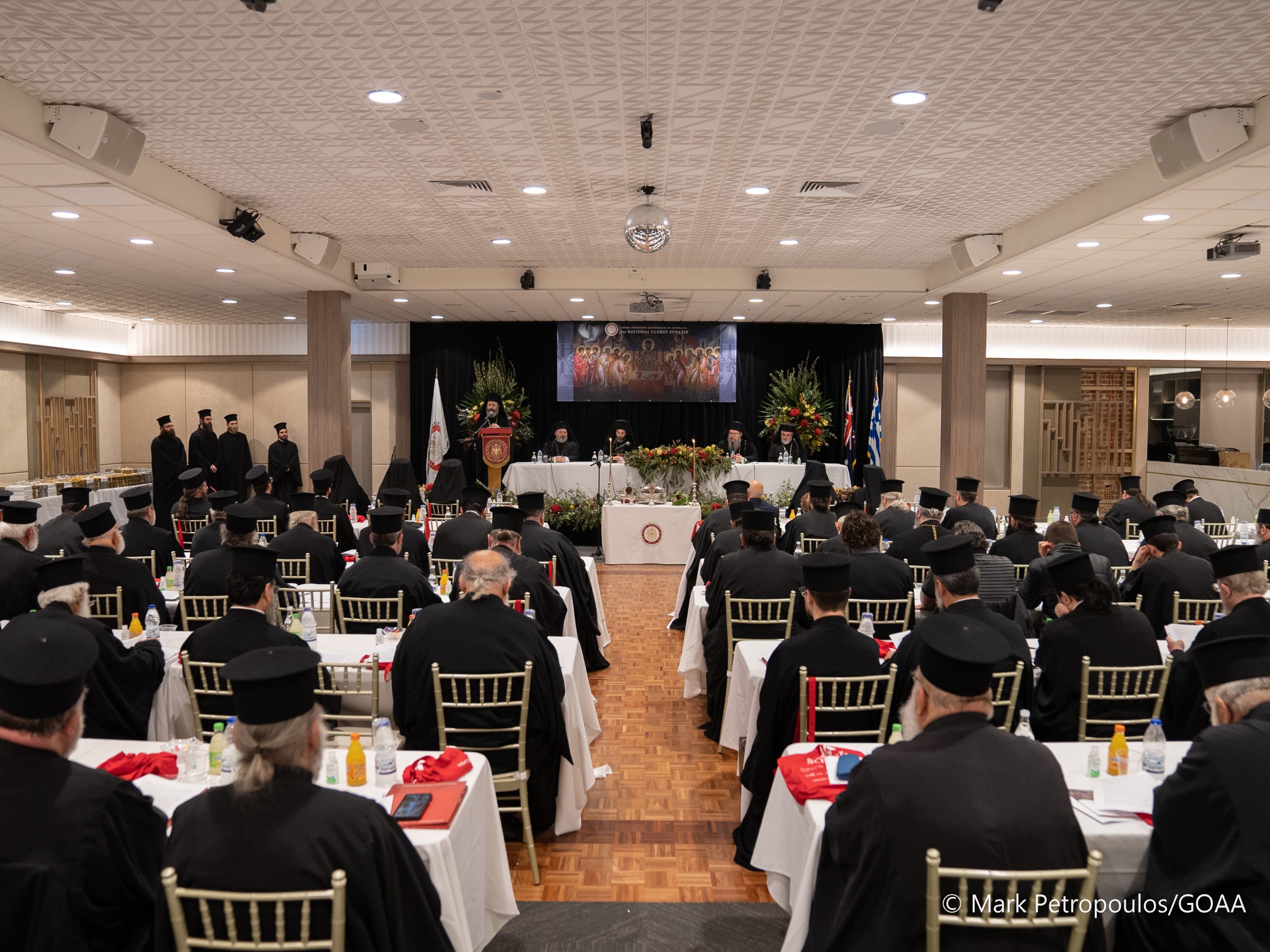
Each presentation was followed by constructive discussion, in which the priests had the opportunity to ask questions, but also to give their own accounts on the issues according to their own experience, highlighting the common desire for the best possible ministry of the Christ-loving people in obedience to the Mother Church and its Synodal governance.
In the end, His Eminence Archbishop Makarios of Australia thanked His Grace Bishop Christoudoulos of Magnesia for his support of the conference and the meal, as well as all the members of the Holy Archdiocese of Australia who worked to organise this successful event. The first day ended with a dinner hosted by St Basil’s Homes of the Holy Archdiocese of Australia at the Parish of St Spyridon, Kingsford with the evident satisfaction of all for the spiritual interaction and the substantial benefit from this – the first National Clergy Synaxis.
More photos:
